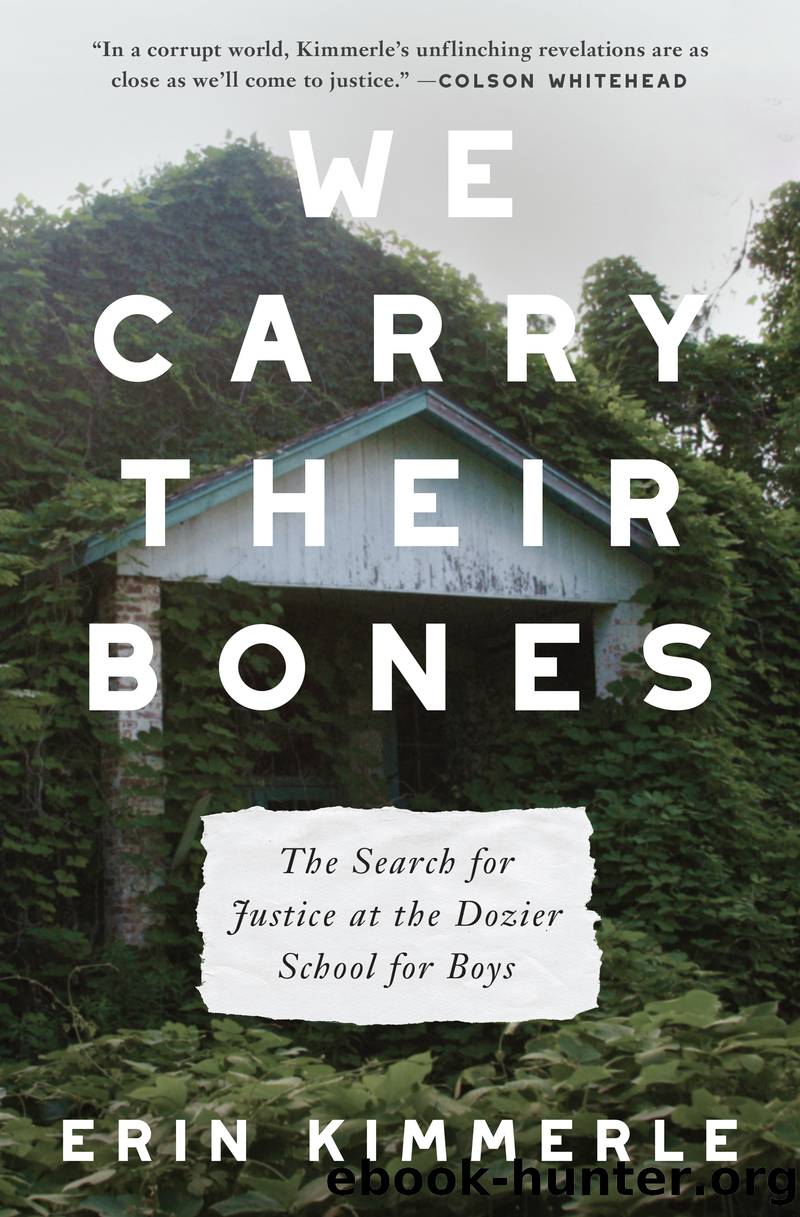We Carry Their Bones by Erin Kimmerle

Author:Erin Kimmerle
Language: eng
Format: epub
Publisher: HarperCollins
Published: 2022-04-26T00:00:00+00:00
Chapter 9
âOftentimes, History Doesnât Include the Good Partsâ
Some townsfolk were not yet willing to come to terms with the fact that they had aided and abetted a system of cruelty. Reconciling those thingsâthe light and the darkâcame at an embarrassing cost. We tried to make ourselves at home in a place that seemed on the surface to be interested in welcoming outsiders, but we heard the whispers. They said we were in it for the money. We were in it for the publicity. We were striving for fame and media attention. We were ruining their town. We were killing tourism. We were decimating their economy. We were trying to make them look bad. We didnât understand that the abuse happened in a bygone era. We were not from there and we didnât know how things worked. The state representative from Jackson County wrote letters to the university president demanding that I stop my research. She sent the same letters to the Florida governor. Her constituents blamed us for the school closure and the loss of two hundred jobs, even though a fresh Department of Justice investigation had found deplorable conditions. They called me unethical. They accused us of trying to get African Americans riled up. They accused me of âsecret communicationsâ with reporters. They accused me of focusing on the negative examples and ignoring the thousands of boys who benefited from their stay at the school. They said the wards at Dozier had had it better than at home; at least at Dozier they got clothes and food.
All this angst festered in a place steeped in its own whitewashed version of history, a place where the church rolls had carried the same last names for two hundred years, where you could still find stately antebellum plantations lining quiet country roads like Confederate sentries. Every year they reenacted a small Civil War battle and revived old Rebel ghosts on graveyard tours. A tall obelisk in front of the courthouse honored the soldiers of the SouthââWe care not whence they came . . . their cause and country still the sameâthey died and wore the grayââjust a stoneâs throw from where Claude Neal hung in 1934.
And, of course, race was entwined in everything. On a tour of an old plantation, one county official told me that Blacks only had it bad after the war.
âThe Civil War?â I asked, astonished.
He corrected me: âThe War of Northern Aggression.â
That was when it fell apart and they became impoverished, he said, without white caretakers. Before the war, they worked on the farms and had a place to live and were cared for, like one big family. He believed this. His was the same communal mentality that wanted to preserve a moral, decent image of Dozier.
THIS SENTIMENT WAS unexpected. I thought this was all behind us. Talking about racism could be difficult; it was ultimately about what people valued, and that required empathy. I felt like I had a lot of empathy for the feelings of the families and victims.
Download
This site does not store any files on its server. We only index and link to content provided by other sites. Please contact the content providers to delete copyright contents if any and email us, we'll remove relevant links or contents immediately.
Cecilia; Or, Memoirs of an Heiress — Volume 1 by Fanny Burney(32559)
The Great Music City by Andrea Baker(32021)
Cecilia; Or, Memoirs of an Heiress — Volume 2 by Fanny Burney(31957)
Cecilia; Or, Memoirs of an Heiress — Volume 3 by Fanny Burney(31943)
We're Going to Need More Wine by Gabrielle Union(19050)
All the Missing Girls by Megan Miranda(16036)
Pimp by Iceberg Slim(14514)
For the Love of Europe by Rick Steves(14144)
Bombshells: Glamour Girls of a Lifetime by Sullivan Steve(14078)
Talking to Strangers by Malcolm Gladwell(13374)
Norse Mythology by Gaiman Neil(13371)
Fifty Shades Freed by E L James(13245)
Mindhunter: Inside the FBI's Elite Serial Crime Unit by John E. Douglas & Mark Olshaker(9345)
Crazy Rich Asians by Kevin Kwan(9295)
The Lost Art of Listening by Michael P. Nichols(7507)
Enlightenment Now: The Case for Reason, Science, Humanism, and Progress by Steven Pinker(7315)
The Four Agreements by Don Miguel Ruiz(6766)
Bad Blood by John Carreyrou(6624)
Weapons of Math Destruction by Cathy O'Neil(6282)
